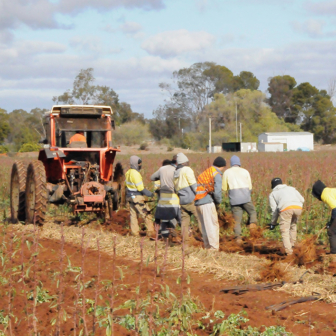“I try also one kitchen hand opportunity in Fitzroy. For a Vietnamese restaurant. Oh my God! I decided to quit right after my first day because it’s very dirty, very small and very dirty. They ask me to use my bare hands to wash the dishes and they don’t have a [dish]washing machine… I ask them when I would be entitled to receive wages and she said, ‘Because you are unexperienced so let’s see… just work for your trial… When I see you have improvement I’ll tell you when I will pay you, but for the time being [you must work] without payment.’”
— Vietnamese postgraduate student
International student workers are ubiquitous in the capital cities of Australia. Take a taxi in Sydney, there is a good chance the driver is an international student; walk into a cafe in Melbourne, the staff are likely to include international students; purchase petrol in Adelaide and the attendant may very well be an international student. According to the best evidence, more than half of the hundreds of thousands of international students in Australia engage in paid work.
Given the financial pressures many of them face, this is hardly surprising. Living costs are higher here than in their home countries; student fees amount to thousands of dollars annually; and international students don’t have access to Austudy and other forms of government assistance.
What might come as a surprise is the fact that exploitation of international student workers is widespread. A 2005 study based on 200 interviews with international students found that 58 per cent of interviewees were paid below the minimum wage, earning between $7 and $15 per hour. A recent survey of more than 200 international students by a union, United Voice, found that 60 per cent earned less than the national minimum wage ($16.37 per hour), with a quarter of respondents receiving $10 or less per hour.
Official recognition of the problem is almost non-existent. In 2008, the Victorian Equal Opportunity and Human Rights Commission documented the racism and discrimination suffered by Victorian international student workers for a Victorian government inquiry. The number and significance of complaints from migrant workers in general prompted the workplace enforcement agency, the Fair Work Ombudsman, to establish an Overseas Workers’ Team in 2012. Meanwhile, the problem persists: when we interviewed twenty-one international students working in Melbourne cafes and restaurants last year, we found that all but one of them had been underpaid or not paid at all in at least one of their jobs.
What lies behind this exploitation? The primary factor is the vulnerability of international students in Australian workplaces. Like other newly arrived employees, they lack local knowledge, language skills and familiarity with labour laws, and they experience discrimination especially on the basis of race and ethnicity. But they also lack access to the rights and entitlements enjoyed in these workplaces by Australian citizens and permanent residents. The visa limit on their hours of work – presently forty hours per fortnight during term time – can also be a source of vulnerability: employers can use the fear of the consequences of a breach, including potential deportation, to impose abusive working conditions.
But that vulnerability is only part of the story. It is no coincidence that many of the sectors in which international students work – cleaning, retail and taxi-driving, for instance – are poorly paid, precarious and plagued with breaches of workplace laws. The hospitality sector is perhaps the best example of how the vulnerability of international students interacts with employer practices in hazardous industries. Currently the focus of a campaign by the Fair Work Ombudsman in response to the serious incidence of non-compliance, employers in the hospitality sector have repeatedly been found by courts to be in breach of working conditions.
Why, then, despite the publicly available evidence and frequent media coverage, have governments done so little? Two (unsatisfactory) reasons seem to discourage official action. First, international students are typically seen only as consumers (or, as some critics put it, “cash cows”) in Australia’s education market, not as members of the local workforce. Second, and related, government policies to regulate temporary migrant employment have overwhelmingly focused on workers employed under 457 visas and other dedicated temporary labour schemes.
A current Senate inquiry presents an opportunity to break this silence. The Senate Education and Employment References Committee is examining the impact of Australia’s temporary work visa programs not only on the labour market but also on temporary visa holders themselves. The inquiry is broad, extending well beyond the 457 visa program, and has an important focus on exploitation and mistreatment. We hope that this inquiry seizes the opportunity to acknowledge the acute problem of the exploitation of international student workers, that it affirms the entitlement of these workers to workplace justice, and that it begins the process of ending the exploitation that appears to underwrite key industries in this country and the higher education sector. •




